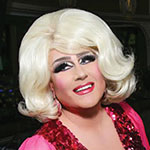Marcus Reeves
Sighs Ten
The Cat’s Back, Wandsworth, London, UK, May 6, 2018
Reviewed by Fiona Coffey for Cabaret Scenes

This was the second outing for Marcus Reeves’ solo show Sighs Ten as part of London’s Wandsworth Fringe Festival, after its highly successful debut at London’s iconic gay venue, The Glory, in November 2016. Billed as “a darkly comic journey through twenty-first century love and sex,” it comprises a scintillating set of original songs and poetry from the multi-talented Reeves, whose body of work over the past two decades reflects his restless artistic ambition. Experimenting with different personae, as well as different musical genres (pop, rock, gospel, musical theater), he has been an ambitious and important contributor, both onstage and off, to London’s alternative cabaret scene. Sighs Ten is something of a “Reeves Unplugged” show. Casting aside the signature glittery face mask, he reveals an unassuming thirty-something man in a pink hoodie.
Opening with the charming and upbeat pop song “Three Little Words,” Reeves follows with a funny, self-deprecating routine to introduce his poetry, establishing a persona which he both returns to and ruthlessly undercuts throughout the set.
The second poem, “Ghosts” (although ending on a quip), ushers in a sequence of song and poetry that strikes a more serious note: experiences of love and lust that are not played for laughs, even though his gifts of sharp observation and ironic humor are never absent. “Parallel Lives” and “Nighthawks” are superb, soulful and gloriously melodic pop ballads, showcasing Reeves’ considerable songwriting talent as well as his gorgeous rich, baritone voice.
Around the half-way mark, there is a change of scene as Reeves introduces his comic impersonation of Sister Wendy—a real-life British nun and art historian who achieved unwanted fame in the 1990s, and the muse for his musical Postcards from God – The Sister Wendy Musical. The art history theme continues with “The Campbell’s Can Soup-er Man,” his Warhol-inspired song. This was a segment that he appeared to particularly enjoy, and struck a winning chord with the audience.
Though I have mixed feelings about the use of complex backing tracks in the pared-down aesthetic of a one-person show in an intimate venue, the musical arrangements created with Michael Roulston are beautiful and highlight the versatility of Reeves’ work. “The Woodcutter’s Song,” a great number with a rinky-dink piano arrangement, was a distinctive and catchy contribution to the set.
This is a show about love and sex from a gay man’s perspective, but Reeves’ songs and poems, such as “You’re a Lovely Guy” and “For Jack,” are all highly relatable and most speak to universal themes. Yet, there is no happy ending for the man in the pink hoodie. He closes with the self-penned “Mad Bad World,” a bleak number delivered with the stage bathed in blue light. With no mitigating encore, it created a strong statement, but also a sense of ambiguity about where to locate the heart and soul of this show.
Sighs Ten is an exploration of an artist’s creative terrain in which we are invited to piece together our own meaning from the disparate elements of a fine, beautifully crafted body of work. Even as Reeves bares his soul and makes us laugh, he cuts an enigmatic figure. And maybe this is just how he wants it to be.





